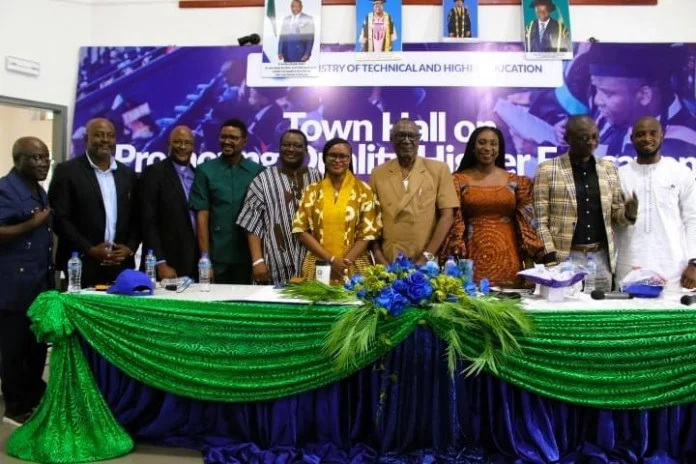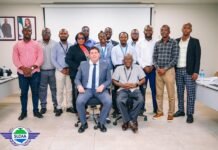By Amin Kef (Ranger)
In a concerted effort to enhance the quality of higher education in Sierra Leone, the Ministry of Technical and Higher Education (MTHE) partnered with the Ministry of Information and Civic Education (MOICE) to host a Town Hall Meeting at Fourah Bay College’s Multi-purpose Hall on September 26, 2024. The initiative was aimed to address the growing challenges faced by universities, particularly in light of the Free Quality School Education (FQSE) program, which has led to a significant increase in student enrollment across the country’s tertiary institutions.
The Town Hall, themed around: “The Role of Universities and Quality Education” and “The Impact of Financing on Students and Communities,” brought together key stakeholders from Government, academia and civil society to discuss ways to uphold and promote quality in higher education. The event underscored the critical need for adequate support and resources to ensure that universities can cater to the rising demand while maintaining high educational standards.
In his welcome address, the Deputy Minister of Technical and Higher Education, Sarjoh Aziz-Kamara, emphasized the importance of inclusivity in national dialogues concerning education. He explained the deliberate decision to conduct the meeting in Krio, the widely spoken local language, to ensure that all citizens, regardless of their educational background, could fully engage with the discussions. Sarjoh Aziz-Kamara praised President Julius Maada Bio’s commitment to education and urged participants to engage in open and honest discussions on the future of education in Sierra Leone.
“Education is the backbone of national development,” he remarked, encouraging citizens to prioritize the educational advancement of the nation’s youth for the collective benefit of all Sierra Leoneans.
Delivering the keynote address, Minister of Technical and Higher Education, Dr. Haja Ramatulai Wurie, expressed her gratitude to MOICE for its role in organizing the event and reiterated the Government’s commitment to education. She noted that President Bio has consistently placed education at the top of the national agenda, recognizing that a well-educated youth population is the country’s most valuable asset.
“Investing in the youth through quality education is pivotal to building a nation’s human capital,” Dr. Wurie said. “It equips our students with the skills needed for Sierra Leone’s socio-economic growth and supports the National Development Plan.”
She further highlighted the importance of aligning university curricula with the needs of the labor market, revealing that the Ministry had conducted a labor market survey as part of its strategic efforts to identify key growth sectors. The results of this survey, she explained, will be used to adjust tertiary education curricula to ensure that graduates are well-prepared to meet the demands of the workforce. The initiative also ties into the Government’s plan to create 500,000 jobs for young people under the Youth Employment Scheme.
A key highlight of the event was a panel discussion on “Sustainable University Financing,” moderated by Imran Sillah from the Strategic Communication Unit of MOICE. The panel, featuring experts from Government and academia, delved into the financial challenges facing universities and explored potential solutions to ensure their sustainability.
Professor A.M. Alghali, Chairman of the Tertiary Education Commission (TEC), delivered a critical assessment of the current state of university financing. He argued that insufficient funding and financial mismanagement were two of the most pressing issues impeding the progress of Sierra Leone’s universities. He specifically called for a comprehensive overhaul of fee structures and the establishment of endowment funds as a sustainable source of support for universities.
“Without proper financing, our universities cannot fulfill their mandates,” Prof. Alghali stressed. “We need frank discussions on the fee structures if we want our institutions to thrive and deliver better services.”
Responding to concerns raised by students regarding misappropriation of fees, Prof. Alghali condemned the practice of diverting funds intended for specific purposes. He described this as a form of mismanagement that is detrimental to both the quality of education and the overall financial health of universities.
Prof. Alghali also encouraged universities to engage their alumni networks, particularly successful graduates, in contributing to the growth and sustainability of their alma maters. “Alumni support is a form of payback and can provide much-needed resources for universities,” he said.
Another critical issue raised during the Town Hall was the need for universities to continuously update their curricula to align with modern trends. Prof. Alghali urged universities to upgrade their courses, pointing out that many programs currently offered are outdated and no longer relevant to the needs of today’s job market.
“Universities must understand that they do not exist merely to collect fees but to provide quality education,” Prof. Alghali asserted. He also warned that TEC would hold lecturers accountable if they failed to deliver adequate services to students, emphasizing the importance of high-quality teaching in shaping the future workforce of the nation.
The Town Hall meeting provided a valuable platform for stakeholders to engage in a candid and productive discussion on the future of higher education in Sierra Leone. The collaboration between MTHE and MOICE reflects the Government’s dedication to improving the quality of education and addressing the challenges posed by the rapidly increasing demand for university spaces.
As Sierra Leone continues to invest in its educational institutions, ensuring sustainable financing and aligning curricula with the needs of the labor market will be crucial to preparing the nation’s youth for success in a competitive global economy.




